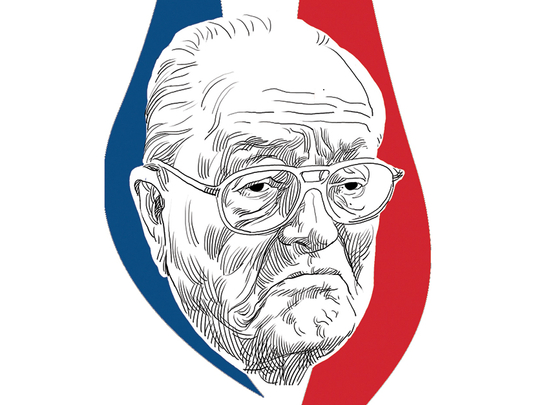
Life sometimes deals one a pleasant surprise. So French President François Hollande, recently on tour of the Gulf region, must be thinking. The announcement of the suspension of extreme-right leader Jean-Marie Le Pen from the National Front — a party he founded — must be music to his ears.
On the one hand, it is comforting to know that this act increases the chances of the Front’s leader, Marine Le Pen, the daughter of the deposed honorary president of the party, to make it into the second round of the next presidential elections — and consequently, increasing the chances of whoever she will be running against. On the other hand, it siphons support from the centre-right UMP coalition — at least that of those who are most right-wing — who may opt to join Marine after her controversial father’s departure, thus weakening the support base of UMP president Nicolas Sarkozy and reducing his chances of beating Hollande in the first round.
In other words, it’s a win-win situation, for Hollande, whichever way he looks at it.
Jean-Marie Le Pen was suspended from his party on Monday on the grounds that he had expressed some personal views in an interview that did not reflect the official line of the party.
His title of honorary president is expected to be done away with after an extraordinary assembly soon to take place. The 87-year-old, who was first elected to parliament in 1956, has been advised to enjoy a well-deserved retirement.
Naturally, he refused to take the issue lying down, criticising the “suspension” amidst shouts, screams and threats, but the die has been cast. One look at opinion polls, in which 87 per cent of National Front voters want him to retire, makes it clear that he is well past his sell-by date.
The French people had become accustomed to Le Pen’s eccentric comments. For journalists, he was an easy target who was ready to express his opinion on matters considered inflammatory in a well-thinking French society — among them, talking about the potential merits of the Vichy regime of Marshal Pétain during the Second World War and belittling the Holocaust. A sneaky question precedes a truculent answer, and the good souls cry foul.
Failed tactic
Such behaviour has been a political tactic of Jean-Marie in his long political career — to create the buzz — and his traditional supporters had nothing to say against it. For a gathering of former pro-French Algeria supporters, genetically anti-De Gaulle militants and small grocers, Le Pen said what nobody else would dare say.
But at some point the tactic failed to get new members to join the Front — a motley gathering of “right-leaning” people convinced that UMP is not going far enough; leftist workers hit by the economic crisis and former members of the communist party; young militias tired of references to the wars in the past, and those — from both the left and the right — fed up with the arrogance of the ruling political class.
Worse, Le Pen’s provocative words have harmed a party, which now commands the support of 25 per cent of the French electorate and more importantly, is entrenched at a regional level in all aspects of French political life.
The National Front political platform has also changed. From a former ultra-nationalist position on the home front — crime and immigration — to a rather flexible and liberal stance on the economy and a pro-Western stance on the international front, with a mix of pro-American and pro-Israeli devotees (certainly not pro-Palestinian), the Front has become more complex, obviously due to the new political lieutenants hailing from many different walks of life, who surround Marine today.
The most visible change is on the economic front, where the party has taken on an anti-euro and anti-EU stance. There is, however, no major evolution of the party’s stand on immigration and crime.
But coming back to the role of businesses, social affairs and the role of the state, one thing is certain: Marine Le Pen is far more leftist than her father. Her proposals regarding working hours, hiring and social benefits are much closer to leftists than Hollande’s neo-liberal policies.
Lastly, Marine, who has repeatedly attacked Arab states, with particular emphasis on Qatar, is openly pro-Vladimir Putin — something her father would probably never have done. The decision to get rid of this unique political animal, Jean-Marie Le Pen, was probably not an easy task for the leader of a party who is the daughter of the man who built it up.
The risk of the party splitting is minimal; on the contrary, the announced extraordinary meeting of the National Front will give Marine Le Pen the freedom she needs to pursue her unbelievable course.
As of today, it seems Sarkozy will win the UMP Primary elections (he knows how to do it); but he could lose against Hollande in the first round as the economy is expected to start improving in 2017.
The question then is: Where will Sarkozy’s votes go in the second round?
Evidently, Hollande may still have valid reasons to remain concerned...
Luc Debieuvre is a French essayist and a lecturer at Iris (Institut de Relations Internationales et Strategiques) and the Faco Law University of Paris.










